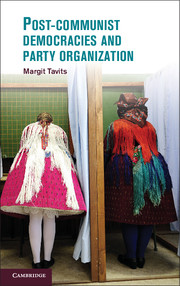7 - Conclusion
Published online by Cambridge University Press: 05 June 2013
Summary
The establishment of stable parties is critical to democratic stabilization. How parties and party systems evolve and stabilize has, therefore, been one of the most important questions in the context of democratic transitions in post-communist Europe. Understanding why some parties succeed in becoming the defining features of the new party systems and others fail is central to answering this question. The results of this study suggest that the electoral success and survival of the party, and its elite cohesion, crucially depend on its organizational strength. The stronger the party organization (the larger its membership, more extensive its local presence, and more professional its staff), the more electorally successful the party. Even within the same party, the organizationally stronger the party branch in a given electoral district, the more electorally successful the party in that district. Organizationally strong parties are also more likely to successfully overcome any crises and survive as significant players than their organizationally weak counterparts. Additionally, such parties are significantly better able to keep their representatives unified and the party cohesive in office.
Party organizational strength positively affects electoral success and survival because a strong grassroots presence, permanent structures, and professional management make it possible for parties to have immediate, frequent, and organized contacts with the electorate, and to credibly portray themselves as competent, reliable, and accountable. This, in turn, allows parties to more effectively shape voters’ biases in their favor and thereby mobilize support for the party. This book shows that parties with strong organizations in CEE could and did use their members and local structures for mobilizing voters and creating sustained contacts with them, getting involved in local affairs, training new candidates, and gathering policy ideas. These activities helped generate support for the party and sustain the support even through political crises. Professional staff, on the other hand, was largely responsible for managing diversity and conflict within the party organization, further helping sustain the image of reliability and accountability and, consequently, electability.
- Type
- Chapter
- Information
- Post-Communist Democracies and Party Organization , pp. 195 - 202Publisher: Cambridge University PressPrint publication year: 2013



